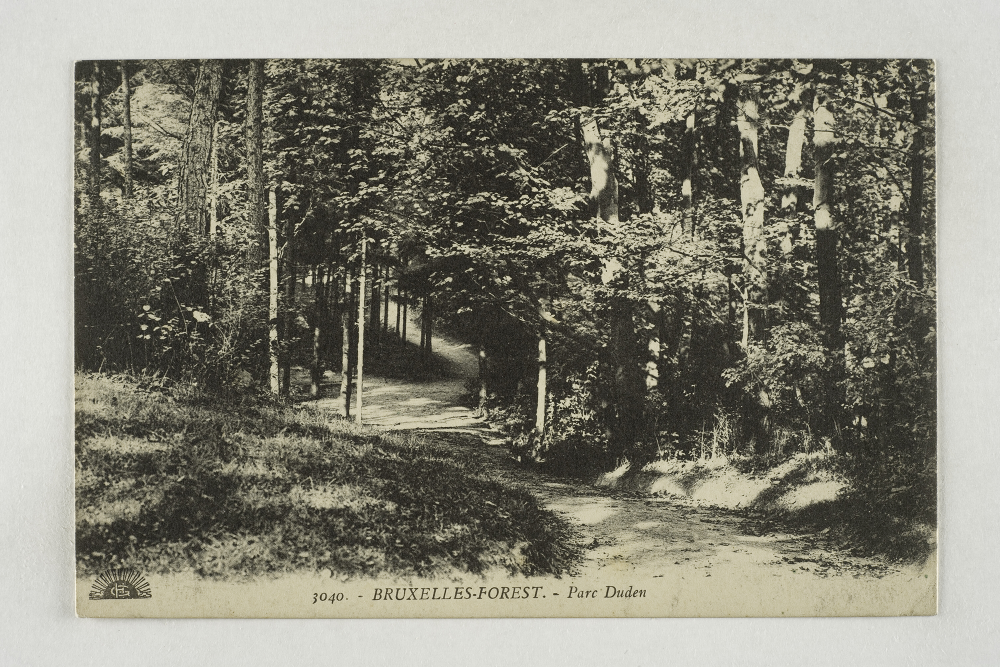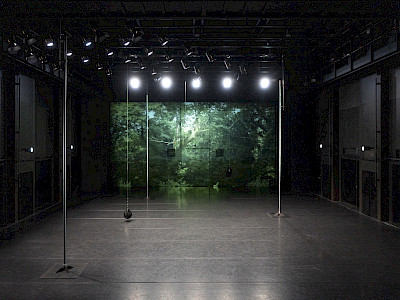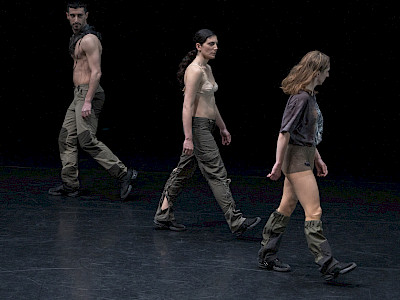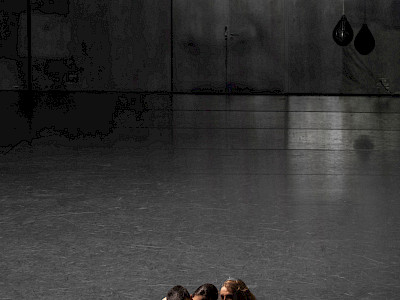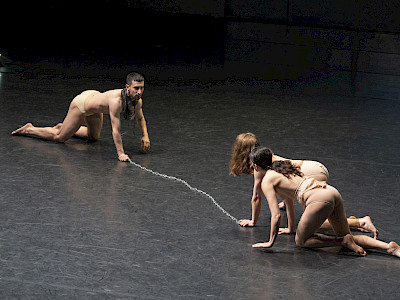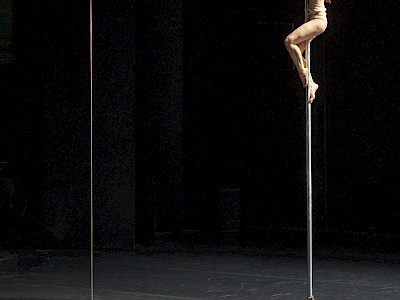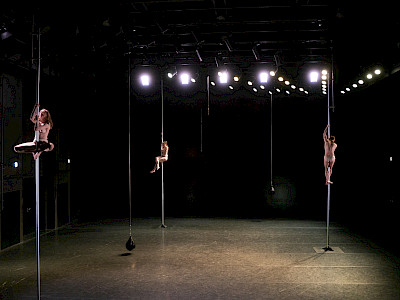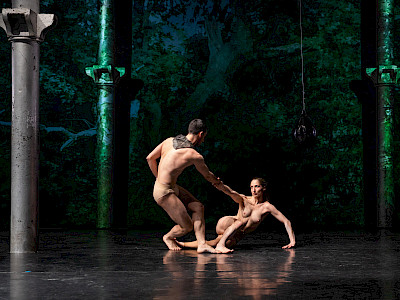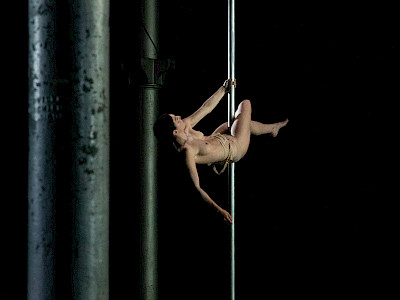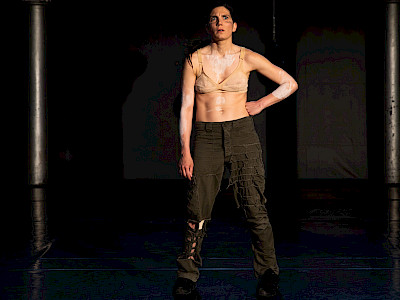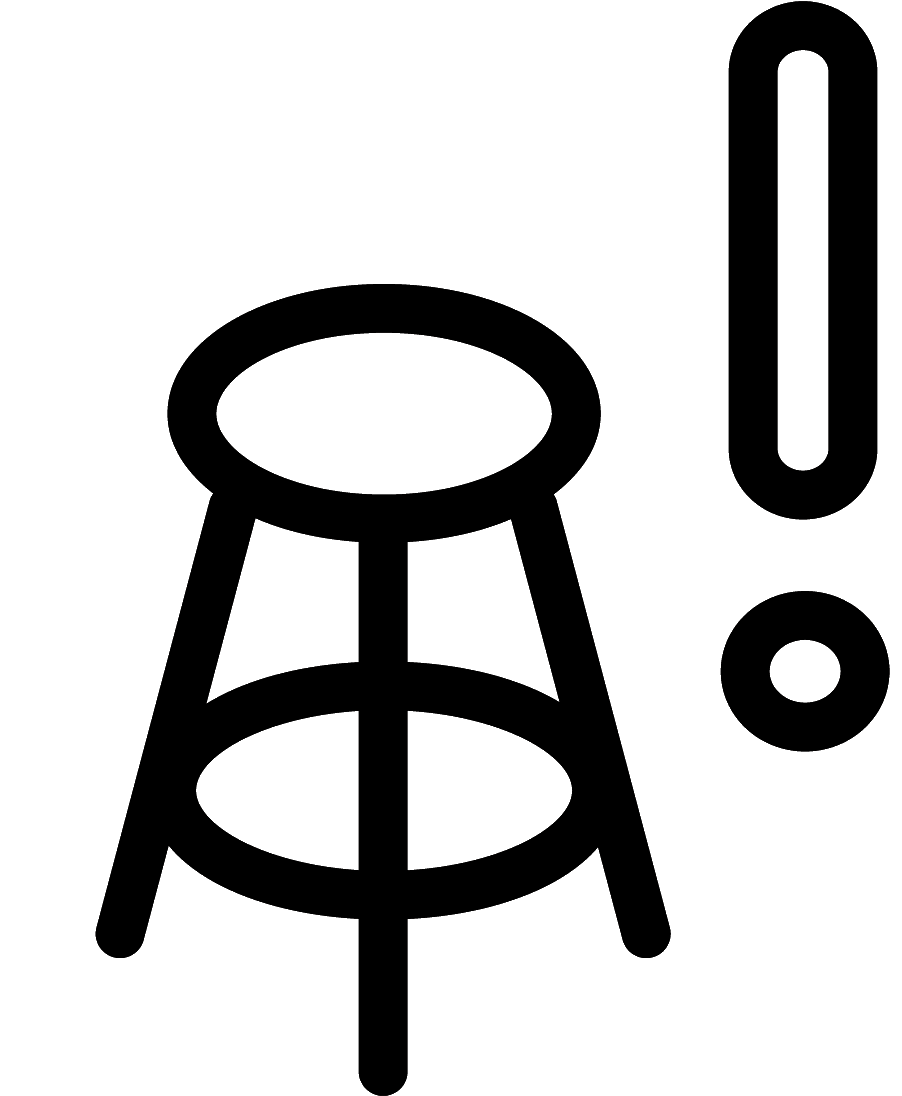13.05, 14.05, 17.05, 18.05.2023
Some of the parks in European cities, such as the Duden Park in Brussels, were once used as hunting grounds, an urban periphery where the idea of the wild was projected and the idea of conquest was celebrated. This new creation by Lenio Kaklea transports us there. Born in Greece and trained in classical and modern dance, she has created several acclaimed performances in recent years in which dance skillfully merges with a reflection on the way female bodies are portrayed. In Αγρίμι (Fauve), hunting, sexuality and dance are brought together, their relationship with the gaze explored. For Kaklea, the forest is an environment where bodies aren’t captured in their unity; we have to enter the forest in order to feel the presence of what cannot be summed up in an image. She challenges the theatre as a place where the gaze reigns, working with pillars to create a discontinuous space where bodies escape perennial exposure. Together with two other dancers, she lends substance to choreographic material that evolves in volume and intensity, like a gust of wind suddenly passing through the woods, or the sudden movement of an untamed animal. Αγρίμι (Fauve) is presented in two versions: one for the theatre and one for the Duden Park at dawn, when hunting used to begin in the city.
Αγρίμι (Fauve)
The Ardennes, the Black Forest, Broceliande, the Vexin. Forests are spaces that can elude immediate understanding. Here, humans and animals scatter and hide, stalking, pursuing and trapping each other. Places of calm and meditation, of ecstasy and vivid life, forests can also be threatening and toxic environments. In Αγρίμι (Fauve), Lenio Kaklea meticu-lously choreographs a ‘rewilding of bodies’. Through on-stage exercises, dances and rituals, she explores the forest as a place – both physical and imaginary – for the dissolution of identities and the metamorphosis of bodies. Linking Kaklea’s choreographic creation to the geographical, environmental and poetic richness of the forests for the first time, Αγρίμι (Fauve) presents dance as another wild zone to be defended.
Lou Forster
March 2023
The title Αγρίμι (Agrimi) takes me back to the cultural history of this word that I often hear in Greece to mean a non-domesticated wild animal or an antisocial woman or girl. To my eyes, these free women refuse to see their destiny as being associated with the domestic (oikos). They are looking to blossom outside of the context of marriage, reproduction and the home. Placing the word “agrimi” at the heart of this creation allows me to link our perception of female sexuality to our relationship with the world of the wild. It’s my way of invoking an otherness to domestication.
Lenio Kaklea
March 2023
THE BEAR WOMAN TALE
“Once upon a time, during autumn, a woman left her family and went into the woods. A strong wind arose – there was a storm. She could not see anything; she was lost, her reserves were exhausted, she wandered around in the forest. On the ground she noticed the footprint of a bear, which she followed to a lair in order to kill it. But by penetrating the ground between the roots of the trees, she discovered a lit human dwelling. She stayed living with its inhabitants for the rest of the winter, in the depths of the woods. In the spring they said, ‘Our friends from the village are coming to visit us tomorrow.’ The next day, through a hole in the lair, she saw them. One of the men volunteered, put on bear fur, and went out. He walked over to meet them. Blows broke out, he defended himself very little so as not to hurt them unnecessarily. The hunters cut him up, cooked the meat, and ate him. The woman thought: ‘I didn’t know that the bear was also a person. I have seen how we kill them and how we eat their flesh. If I go back one day, I will tell them.’ And she went back. In the village she was welcomed with joy and she told them everything she had learned. Since that time, people have known that beasts are human and that some people go out to meet them.”
From a Nivkh tale, reported by Charles Stepanoff in Voyager dans l’invisible. Techniques chamaniques et l’imagination [Journeys into the Invisible – Shamanic Imagination in the Far North], Paris, La Découverte, 2019, pp. 371-372.
Presentation: Kunstenfestivaldesarts, Charleroi danse
Concept, choreography and direction: Lenio Kaklea | Text edited by Lou Forster and Lenio Kaklea from a Nivkh tale, retranscripted by Charles Stepanoff in Voyager dans l’invisible. Techniques chamaniques et l’imagination, Paris, La découverte, 2019 | Performers: Lenio Kaklea, Georgios Kotsifakis, Ioanna Paraskevopoulou | Sound design and stage management: Éric Yvelin | Video image: Sophie Laly | Scenic elements: Clio Boboti | Lights: Bruno Pocheron | Costumes: Olivier Mulin | Dramaturgy and research: Lou Forster | Creative assistant: Dimitris Mytilianos | Assistant set designer: Filanthi Bougatsou | Pole dance training: Mandi Fragiadaki | Production and administration: Chloé Schmidt | Bookings: KUMQUAT — performing arts (Gerco de Vroeg & Laurence Larcher)
Production: abd | With the support of Hermès Foundation enterprise | Coproduction: Kunstenfestivaldesarts, le CN D Pantin - Centre national de la danse, Festival d’Automne à Paris, Theater Spektakel, Le Dancing - CDCN de Dijon, Pôle Sud - CDCN de Strasbourg, La Briqueterie - CDCN Val de Marne in the context of “Accueil Studio 2023”, ImPulsTanz International Festival and DanceWEB Life Long Burning Network, Serpentine Gallery London
Performances in Brussels with the support of the French Institute and the French Embassy in Belgium, in the frame of EXTRA
abd receives the support of DRAC Ile-de-France under the title Aide au conventionnement 2023-2024
